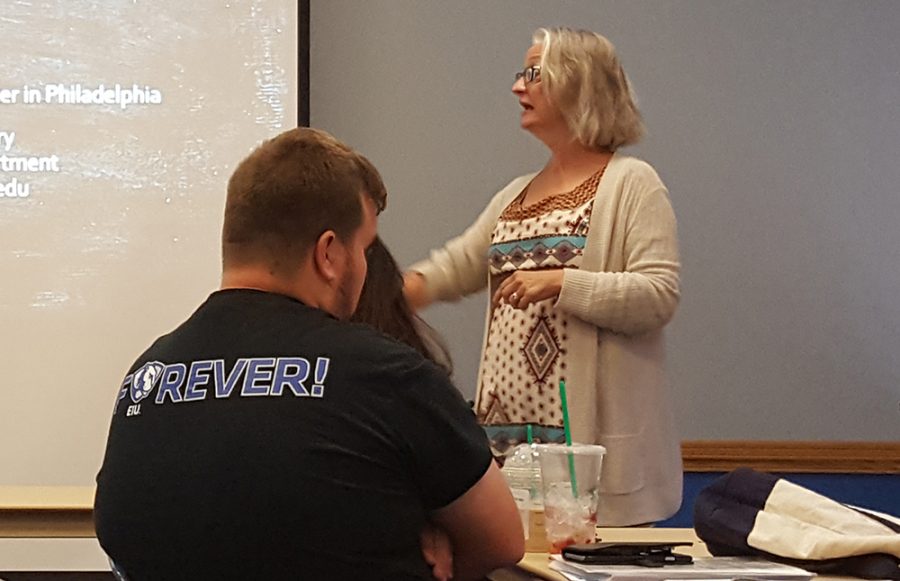Teach-in informs students on election topics
History professor Lynne Curry discusses the currently vacant chair on the United States Supreme Court during “Teach-in: Current Political Issues” in the Oakland Room of the Martin Luther King Jr. University Union Monday.
September 12, 2016
The history department, Office of Civic Engagement and Volunteerism and student government teamed up to conduct a teach-in that addressed current political issues, discussed the history of both major political parties and focused on major issues during the election.
Mark Hubbard, history professor, talked about the Republican Party and focused on where the party is now and how it got to where it is.
Hubbard said the Republican Party largely draws on white America, whereas the Democratic Party is able to draw on a more diverse group of people from all types of backgrounds.
He also brushed on the history of African American voters in America and their shift from the Republicans to the Democrats.
“The Republican Party launched itself as a party opposed to the further expansion of slavery, which those free blacks living in the North who could vote had been agitating for a long time,” Hubbard said.
Hubbard said the switch was made in the 1930s due to the Great Migration, a mass migration of African-Americans from the south to the north where they found out they then vote. The Democrats then made an effort to get the African-Americans votes.
The second thing to cause the switch came from the New Deal, where President Roosevelt invested money into African-American communities.
Hubbard also brought up the Civil Rights Act effectively changing the allegiance. Barry Goldwater, the Republican Presidential nominee at the time, opposed the act itself.
Kevin Anderson, a political science professor, talked about the Democratic Party.
He said Democrats tend to advocate for equality, though he admits this is a broad generalization.
“Everybody should have the chance to step in, voice their opinion, go to school and work hard,” Anderson said.
He also said Republicans tend to advocate for freedom.
“I should have the freedom to do what I want,” Anderson said.
He said there needs to be a balance between freedom and equality, and that too much freedom intrudes on equality and too much equality takes away freedoms.
Lynne Curry, a history professor, talked about the U.S. Supreme Court in presidential elections and why they are important to follow.
She talked about the issues that are related to the students and she pointed out a lot of recent court rulings.
“Everything from marriage equality to statements about clarifications about reproductive rights, how the Affordable Care Act will play out in the states,” Curry said.
She talked about the vacant seat left by Justice Antonin Scalia and that the seat has yet to be filled, leading to a six-month vacancy. This is the longest vacancy period in U.S. history.
Anderson talked a second time, this time it was about race relations.
Anderson said he observed people who think race issues were solved with the election of President Barack Obama, and said in reality more issues are being brought up to the surface, causing clashes.
He said it comes down to a philosophical question.
“How can I treat you equally without treating you the same? If equality is a fundamental construct, then what we have to do is take each individual group in context,” Anderson said. “You can’t treat everybody exactly the same and say you are treating them equally.”
An example he gave was while watching a football game, he heard a commentator talk about how there were twice as many women’s restrooms as there were men’s.
Anderson said since people are different, providing the same amount of restrooms does not count as equality.
Debra Reid, a history professor and publicity chair of the teach-in, showed the people in attendance a website which compares the stances of every candidate on multiple issues.
After the teach-in was done, Anderson said he was on the program to discuss race, but since Andrew McNitt, political science professor, was not in attendance to talk about the Democrats, he took over.
Anderson said a friend of his wrote a book about targeting voters and this helped him with his talk.
Targeting is a political resource allotment practice, where a party will send money, volunteers and time to political campaigns. Resources are sent depending on whether the candidate is in a tough fight, or if the party thinks the candidate can win but needs a little push.
Anderson said the turnout for the teach-in was fine and the turnout will get better as the country moves closer to election day.
Reid said the lecture went well considering bid day was happening at the same time.
She said she would have liked to hear more about women’s rights issues but overall was happy that all of the political issues were brought up.
She said democracy is a messy form of government that relays on participation and for people to voice their opinions on issues.
Samuel Nusbaum can be reached at 581-2812 or [email protected]
















































